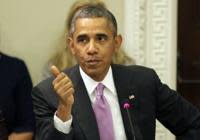Obama’s ‘Lame-Duck’ Status Could Lead to Wall Street Woes
By Marek Fuchs
As we come to the end of this busy week and look toward the coming months, there's plenty ahead that could shake up Wall Street following its latest surge to record highs.


First off: From a political perspective, President Obama — tainted, flimsy peace deal regarding Syria aside — has achieved the near impossible: losing a war before it was even waged. In doing so in such a calamitously inept fashion, he transformed himself nearly instantly into something that tends to unnerve the stock market: a lame-duck president.
Obama's wavering speech on Syria last week called to mind President Carter’s defining “malaise” address and President Reagan’s notorious public admission that, while he told the American people he did not trade arms for hostages and, “my heart and my best intentions still tell me that's true, the facts and evidence tell me it is not."
Facts, as Reagan said, are stupid things. But one fact is fairly well evident: Even in a country of second and third acts, serious political pratfalls can be ruinous — in Carter’s case, for his reelection bid; for Reagan, in a closer parallel to Obama, the remainder of his second-term agenda.
All this could do the stock market, which will be left devoid of a leader, no favors.
It's impossible to draw a direct line from Reagan’s March 1987 Iran-Contra admission to the Black Monday market crash only six months later, but the perceived ruderlessness in Washington was certainly no salve. Similarly, George W. Bush’s standing with the American public was forever punctured after his inexcusably poor response to Hurricane Katrina, which obviously did not cause the 2008 financial crisis but also did not help a financial system that cried out for decisive leadership. And when George H. W. Bush went back on his famous "read my lips" tax pledge, it rendered him politically and financially useless, unable to lift the country out of recession.
Lack of strong leadership never helps: Even when Wall Street is not enamored of the president, traders like nothing more than to rest easily in the comfort of a known quantity.
The possible consequences of a neutered White House got even more serious on Wednesday, when the Federal Reserve surprised the market by making no taper moves. Though Wall Street was initially appreciative that the Fed won't yet be pulling back the lever on its $85 billion per month bond-buying program, the fact that the Fed appears unable to adequately take the temperature of the economy will prove unnerving. Even more troubling, Bernanke said the Fed had been too positive on the economy all along.
The Fed seems as, at least on the surface, to be as befuddled as Obama. So who's in charge here? That's a question the stock market will be asking a lot over the next couple of years, which is problematic, to say the least.
We may see the lame-duck factor play out most definitively in four areas:
The Fed Chief Nomination: The horse race to replace Ben Bernanke as head of the Federal Reserve, the key federal post for anyone with even a thin dime in the stock market, is essential. With his historical standing as a proponent of financial-deregulation policies, Larry Summers was the favored yet very controversial candidate.
On Sunday Summers pulled his name out of consideration, presumably because Obama had no juice left to back him. The stock market jumped on Monday, but this wasn't necessarily a reflection of comfort with the frontrunner replacement, Fed vice chairman Janet Yellen. In fact, Obama, adjusting to his lesser standing, botched the whole thing by letting Summers withdraw instead of pro-actively appointing Yellen so she wouldn't have the taint of a second-choice candidate. Whether it's losing the stature to make appointments or getting forced into sloppy mistakes, a president with lost mojo is constantly unsettling to the stock market.
Budget Messes. The Republicans will be emboldened by Obama’s demise. You think the sequester is disruptive? Wait until you see Republicans in action with Obama rendered inactive. Remember: No matter whom you favor politically, chaotic unpredictability tends to be no friend of stock prices.
The World Gone Wild. Syria makes official what a dissolving Egypt and ascendant Russia were only pointing to: The world is tipping out of control. That Obama’s missteps seem at the heart of the trouble means this lame-duck president can do little to soothe global hot spots, which never bodes well for the oil and currency markets.
The Known Unknowns. No matter what the pop-up crisis du jour, the stock market weathers trouble best when leadership is in peak form. Uncertainty, the shifting positions that come with a weak political standing and, coming soon, the prospect of a presidential race with no crystal-clear favorite is less than favorable for the stock market, which, if nothing else, favors a strong and familiar hand.
Marek Fuchs was a stockbroker for Shearson Lehman Brothers before becoming a journalist who wrote The New York Times' County Lines column for six years. Fuchs speaks regularly on business and journalism issues at venues ranging from annual meetings of the Society of American Business Editors and Writers to PBS to National Public Radio. His recent book, "Local Heroes: Portraits of American Volunteer Firefighters," earned widespread praise. He is on the writing faculty at Sarah Lawrence College. When Fuchs is not writing or teaching, he serves as a volunteer firefighter. You can contact him on Twitter: @MarekFuchs.
